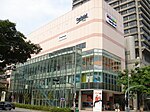The Court of Appeal of Singapore is the nation's highest court and court of final appeal. It is the upper division of the Supreme Court of Singapore, the lower being the High Court. The Court of Appeal consists of the chief justice, who is the president of the Court, and the Judges of Appeal. The chief justice may ask judges of the High Court to sit as members of the Court of Appeal to hear particular cases. The seat of the Court of Appeal is the Supreme Court Building.
The Court exercises only appellate jurisdiction in civil and criminal matters. In other words, it possesses no original jurisdiction – it does not deal with trials of matters coming before the court for the first time. In general, the Court hears civil appeals from decisions of the High Court made in the exercise of the latter's original and appellate jurisdiction, that is, decisions on cases that started in the High Court as well as decisions that were appealed from the State Courts of Singapore to the High Court. However, this rule is subject to various restrictions. Some types of High Court decisions are not appealable to the Court of Appeal, while others are only appealable if the Court grants leave (permission). Where criminal matters are concerned, the Court only hears appeals from cases originating in the High Court. Matters heard by the High Court on appeal from the State Courts cannot be further appealed to the Court of Appeal, though questions of law may be submitted to the Court for determination.
Under the principles of stare decisis (judicial precedent), Court of Appeal decisions are binding on the High Court and the State Courts. As Singapore's final appellate court, the Court of Appeal is not required to follow its own previous decisions and the decisions of predecessor courts such as the Supreme Court of the Straits Settlements and the Judicial Committee of the Privy Council, and may depart from or overrule such decisions if it thinks fit. However, it will generally not do so without a strong reason. The Court of Appeal is required, however, to abide by decisions of the Constitution of the Republic of Singapore Tribunal in certain situations. The Constitution of Singapore states that where the President has referred to the Tribunal a question concerning the Constitution's effect on a bill, no court – including the Court of Appeal – may subsequently question the Tribunal's opinion on the bill or, assuming the bill is found to be constitutional, the validity of any law based on the bill.









